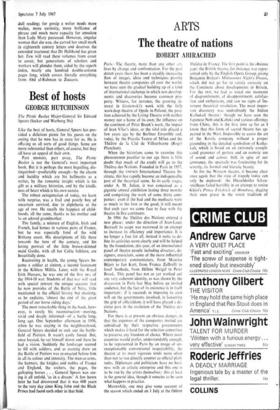Best of hosts
GEORGE HUTCHINSON
The Picnic Basket Major-General Sir Edward Spears (Seeker and Warburg 36s) Like the best of hosts, General Spears has pro- vided a delicious picnic for his guests on the outing that he now has in store for us. He is offering us all sorts of good things. Some are more substantial than others, of course, but they all have an appeal of their own.
Part memoir, part essay, The Picnic Basket is not the General's most important book. But it is perhaps the most beguiling, dis- tinguished—predictably enough—by the charm and lucidity which are his hallmarks as a writer, by the romantic insight which is his gift as a military historian, and by the kindli- ness of heart which is his own nature.
The robust octogenarian of today, we learn with surprise, was a frail and poorly boy of uncertain survival, due to diphtheria at the age of two. He recalls the happiest of child- hoods, all the same, thanks to his mother and to an adored grandmother.
The family, a mixture of English, Irish and French, had homes in various parts of France, but he was especially fond of the wild Brittany coast. His descriptions of life there towards the turn of the century, and his loving portrait of the little brown-skinned maid Gaidic, with all her Celtic folklore, are beautifully done.
Recovering in health, the young Spears be- came a soldier at sixteen, a second lieutenant in the Kildare Militia. Later, with the Royal Irish Hussars, he was one of the first mcs of the 1914-18 war. Students of that war will read with special interest the unique account that he now provides of the Battle of Nery, little mentioned in the official history but marking, as he explains, 'almost the end of the great period of our horse riding days.'
The most remarkable thing in the book, how- ever, is surely his reconstruction—moving, vivid and deeply informed—of a battle long, long ago. One September afternoon in 1956, when he was staying in the neighbourhood, General Spears decided to seek out the battle- field of Poitiers. It wasn't easily found. But, once located, he sat himself down and there he had a vision. Suddenly the landscape seemed to fill with soldiers, and as evening drew on the Battle of Poitiers was re-enacted before him in all its colour and intensity. The men-at-arms, the banners, the knights and nobles of France and England, the archers, the pages, the galloping horses . . General Spears was see- ing it all unfold, 'as in a dream.' A few hours later he had discovered that it was 600 years to the very day since King John and the Black Prince had faced each other in that field.






































 Previous page
Previous page